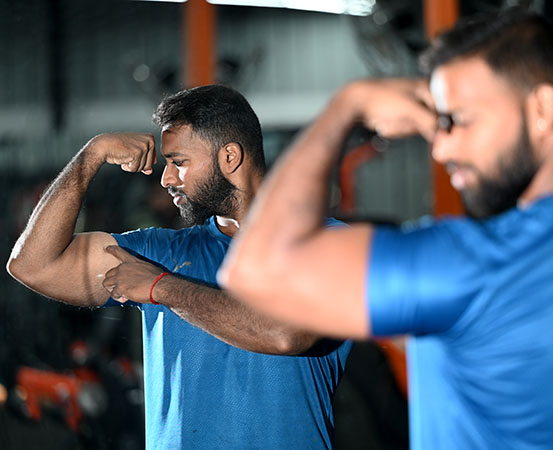
Muscle mass, an important factor in the optics of fitness, is often associated with strength as well. While muscles and their positive correlation with strength is established, muscle size is just one of the variables. It is a significant factor, no doubt. However, the question ‘does more muscle mass indicate more strength?’ does not have a simple answer.
To start with, muscle mass and muscle strength are two entirely different parameters and are measured differently as well. So, it won’t be entirely correct to assume that a person who looks well-built with evident muscles has more strength than someone with a leaner appearance and lesser muscles.
How to measure muscle mass and strength?
“The amount of muscle tissue that is present in the body is the muscle mass, whereas the amount of force that it can produce is the muscle strength,” says Dr Anup Krishnan, a sports and exercise medicine consultant from Mumbai, India.
Different methods such as BIA (bioelectrical impedance analysis), MRI (magnetic resonance imaging) and DEXA (dual-energy x-ray absorptiometry) can be used to measure the muscle mass.
Muscular strength can be measured by 1RM (one-repetition maximum), which assesses the individual’s strength based on the maximal weight he or she can lift for only one repetition using the correct technique. Isokinetic dynamometers are also used to test the strength and power of various muscle groups.
Relation between muscle mass and strength
The fact that a person’s strength will be assumed based on physical appearance and how muscular they are holds true at times. However, that’s not always the case. Muscle mass is one among the many factors that influences strength. Other factors like genetics, age, diet, type of workout, etc. also come into play.
“Muscle mass and strength can usually be directly proportional in the same individual, but when compared between different individuals, they may not be the same,” says Dr Krishnan.
“For example, in some cases, individuals with lesser muscles will still be able to lift heavy weights compared to some who appear to have bigger, well-built muscles.”
“Size does not always equal strength,” says Amit Jedi, a Mumbai-based personal fitness trainer. “Size can be deceptive. The muscle may not have enough functional strength despite appearing big. With excessive volume, muscles cannot retain and recover anywhere close to 100 percent strength level.”
Mass vs strength: Training and diet vary
Since muscle mass and muscle strength are two different factors, it’s important to understand how diet and exercise training differ for each of them.
“It’s necessary to do resistance training in order to build muscle mass, as this would stimulate the release of hormones such as testosterone and growth hormone which are anabolic in nature,” says Dr Krishnan.
“Microtears of the muscles are a prerequisite for muscle growth.”
Protein intake is crucial too. ” Preferably, it is advisable to consume dietary protein during or immediately after a workout session. This would ensure better synthesis of muscle proteins and reduce the amount of the protein breakdown that might happen. It also helps in muscle reconditioning,” adds Dr Krishnan.
When it comes to building strength, the workouts and diet are modified to ensure maximum strength output. Power training or power lifting with low reps is recommended.
“Protein ingestion is crucial during strength training. A normal individual doing resistance training can consume about 1.2 to 1.4 g/kg of protein in a day, while a powerlifter can consume 2.0 to 2.2 g/kg/day,” says Dr Krishnan.
“The nutritional intake must include adequate amounts of all nutrients such as carbohydrates, fats, minerals, vitamins and other micronutrients as well. Proper hydration is also necessary.”
Takeaways
- While muscular mass is the amount of muscle tissue that is present in the body, muscular strength refers to the amount of force that can be produced by the muscles.
- Although muscle mass and strength can be directly proportional in the same individual, they may not be the same when compared between different individuals.
- Muscle mass and muscle strength are two different factors, and it’s important to understand how diet and exercise training differ for each of them.

















